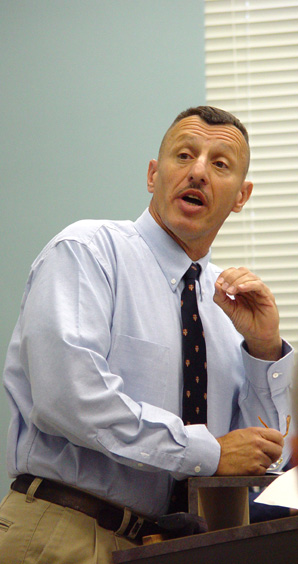

Paul Melshen ’72
"If I were a strategist for Bin Laden, I wouldn’t attack New
York again. I wouldn’t attack Washington. I would attack Cow’s
Bell, Iowa. That would tell the American people, ‘I can touch you
anywhere, anytime, and not just in the big cities.’”
Magazine
Summer/Fall 2002
Dispatch
from
Homeland Defense
Listeners phoned NPR berating the Marine colonel and expert in counter-terrorism, referring to him as “Dr. Doom.”
Six years later, no one wishes he’d been wrong any more than Melshen.
Immediately after the events of 9/11, reporters pursued Melshen, then a professor at the National Defense University, anxious to know when and where the next attack might occur. Soon Melshen was called away from his post to create counter-terrorism strategies with the Joint Forces Command for the Department of Defense.
During Commencement Weekend at Wabash and fresh from his work on Homeland Defense, Melshen offered his perspectives on the country’s war on terrorism. Some excerpts:
• Have no doubt about it, we are at war. This is an insurgency war. You may not see it. That is the amazing thing about insurgency warfare: 99.9 percent of the time, nothing happens, then total violence for a shattering moment.
Terrorism is part of an overall military strategy pursuant to Bin Laden’s political goal. He was very explicit in stating these goals in his 1998 declaration: 1) implementation of Islamic values, 2) the alleviation and destruction of liberal democrat values, 3) withdrawal of U.S. forces from Saudi Arabia, 4) the ending of bombing and lifting of sanctions on Iraq, and 5) the cessation of aid to Israel. What Al-Qaida wants from these terrorist acts is power to implement these goals.
• If I were a strategist for Bin Laden, I wouldn’t attack New York again. I wouldn’t attack Washington. I would attack Cow’s Bell, Iowa. That would tell the American people, ‘I can touch you anywhere, anytime, and not just in the big cities.’”
• U.S. Army Lt. Col. Ralph Peters stated on National Public Radio on September 20 that if the terrorists had the ability to eliminate the United States with the push of one button, they would have done so. That is the enemy we are facing. There is no doubt in my mind that there are cells and sleepers and moles throughout this entire country. No doubt in my mind.
• Some pundits say, “We just don’t understand these people. We have to take more time out to understand what they want, what their needs are.” For the sake of debate, I will grant you that. But that, to me, is the Alpha option. To combat terrorism, we have to have a lot of options. We also have to have the Omega option. The Omega option states we have to kill them before they kill us. People don’t like to hear that.
Growing up in Hammond, Indiana, if some thug came up to me and said, “I am going to kill you and then I’m going to rob you,” and I then told my dear father, “I need to understand this man before I act,” he would have probably said: “Son, you are going to have a hard time at Wabash College.”
• A cliche about insurgency warfare from the 1960s said, “Time is on the insurgent’s side.” That is nonsense. Time is neutral. It is how you use time that is important. When faced with insurgency war, liberal democracies tend to say, “We don’t have a problem—why would anyone not accept our values? Don’t all people want to be members of a democratic society?” When we get into that period of denial, then we lose time—and the terrorists gain it.
• These terrorist groups are like an unsquashable amoeba: you pound them down one way and they come out another way. This is the problem: we sat back and allowed Al Qaida to develop all these cells.
• In 1986, Congress passed the Goldwater-Michaels Act, which reorganized the military. Congress told the services that they would fight jointly and sort out their chain of command. This provides unity of effort and coordination between the services.
There are over 40 different agencies working in the counter-terrorist effort, and this inter-agency system is not coordinated. They don’t have unity of effort. Congress must find a way to develop an inter-agency coordination process in the same way they did with the military.
• Some things we need to do to make a serious effort in this war on terrorism are:
• make the Director of Homeland Security a Cabinet post. I want that position to have Congressional scrutiny and cabinet level power;
• we need a Congressional act to coordinate the inter-agency process;
• we must develop an institution in the civilian community similar to the Joint Forces Staff College—which takes members from all branches of the armed services and tells them they are going to fight jointly. We need this to force them to cooperate.
• we need counterparts to these people at the state and municipal levels so that, if a crisis occurs at those levels, people in those positions have the skills and information to respond quickly and appropriately.
What
are your thoughts?
Click
here to submit feedback on this story.
Return to the table of contents
